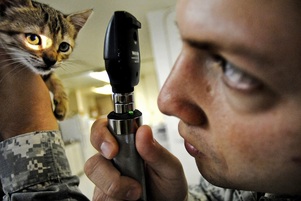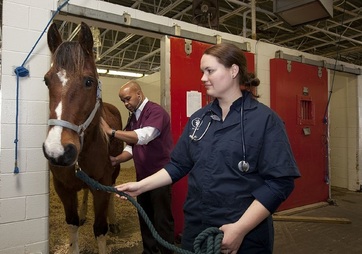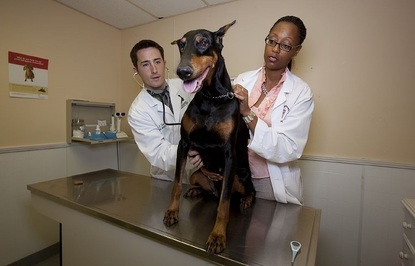|
by Dr. S. Dawn Dinger, DVM  Have you ever wondered how veterinary medicine got started or what your vet needed to do to get where they are now? Here are some fun facts about veterinary medicine that you may not know. 1. References to veterinary medicine have been around for centuries. In fact, the first person credited with being an “expert in healing animals” was a man called Urlugaledinna in Mesopotamia in 3000 BC. The first veterinary school opened in 1761 in Lyon, France. In 1806, Dr. Benjamin Rush (one of our Founding Fathers and a signer of the Declaration of Independence) started lectures at the University of Pennsylvania on “studying the diseases of domestic animals”. In 1879, Iowa State University established the first public veterinary medical school in the United States. 2. Today, there are 30 veterinary colleges in the United States (in contrast to over 170 human medical and osteopathic schools). There are also 5 veterinary colleges in Canada and another 14 internationally which are accredited by the American Veterinary Medical Association, meaning that they pass a rigorous review of their facilities and standards of education. 3. The process of getting accepted into veterinary school is challenging and competitive. Students interested in applying to veterinary school are required to enroll in vigorous pre veterinary curriculums which are heavy in classes such as biology, chemistry, physics and math. Each veterinary school has their own requirements as to what courses are needed, but most prospective veterinary students have a Bachelor's degree at least prior to applying to vet school. Applicants are also required to have extensive animal and veterinary experience as well. Despite this, there are still many more applicants every year than there are spots available.  4. Veterinary school itself is a four year degree program. Its curriculum mirrors that of our human medical colleagues but involves studying a wide range of species, not just one. The first two years are dedicated to studying the normal anatomy and physiology of animals and how the body responds during various disease states. Courses are taken in such things as anatomy, physiology, pharmacology, immunology, pathology and toxicology. The final 2 years have a more clinical focus and include learning about specific diseases and surgical techniques and seeing actual patients under the supervision of veterinarians. 5. For years, veterinary school classes where composed mostly of men however this has changed dramatically over the past 40 years. In 1970, women composed about 10% of the average veterinary class. Today, classes are made up of about 80% women. The career paths of the students have changed as well. In years past, large animal medicine was the career choice for most students (that is, practice focusing mostly on animals such as horses, cows, pigs and sheep). Today, many people still pursue a large animal focus, but the majority of students now plan to enter small animal practice to work mainly on dogs and cats. 6. Have you ever wondered what the difference is between the VMD after Dr. McElhinney's and Dr. Burton-Hall's names and the DVM after Dr. Dinger's? In a nutshell, nothing. Dr. McElhinney and Dr. Burton-Hall received their “Veterinariae Medicinae Doctoris” degree from The University of Pennsylvania, while Dr. Dinger received her “Doctor of Veterinary Medicine” degree from Purdue University. Penn is the only school in the country to confer a VMD degree; the other 29 schools in the US and the 5 in Canada grant DVMs. 7. After graduation, most newly minted veterinarians go into private practice and work on dogs and cats or horses, cows, pigs and other farm animals. Some veterinarians go into exotic animal practice to care for animals such as birds and reptiles. Still others work in animal shelters or zoos. More and more veterinarians are choosing to continue their education another 3-4 years and specialize in one specific area of veterinary medicine such as cardiology, dermatology, ophthalmology or surgery. There are many veterinarians employed in more non-traditional jobs that do not involve direct care of patients. These vets may work in the drug and pet food industries or they may work for the government in the CDC, FDA, NIH and USDA and are involved in biosecurity, public health, disease outbreak investigations and homeland security. There are also a number of veterinarians proudly serving in our military ensuring food safety and caring for military dogs and horses.  8. As in human medicine, veterinary medicine is constantly changing so graduation from veterinary school does not end a veterinarian's education. While formal classroom instruction is over, nearly every state in the country requires a certain number of continuing education hours every year or two years to maintain an active license to practice (Pennsylvania requires 30 hours every two years). This is meant to ensure that your veterinarian is staying current on the latest recommendations and techniques to help your pet. 9. How about veterinary technicians? Technicians also must attend an accredited program (not those correspondence courses that you see on TV!), but there are no pre-veterinary requirements as there are for veterinarians. Most programs are for two years and grant an Associates degree, but there are a few 4 year programs that lead to a Bachelor's degree. Technicians must also pass a credentialing exam and then, depending on the state, are considered either licensed veterinary technicians, registered veterinary technicians or certified veterinary technicians (LVT, RVT or CVT respectively). As with veterinarians, most technicians are employed in private practice, working directly with veterinarians to care for your pet, however technicians can also work in government, industry and the military and some technicians also specialize in specific areas of veterinary medicine such as anesthesia, dentistry, surgery and critical care. 10. You may have noticed on our sign that we are an “AAHA Accredited Hospital”. That sounds good, but what does it really mean? Accreditation is a process by which a hospital's performance and practices are reviewed and compared against current “gold standards” and by which goals are set to continually improve. Unlike in human medicine, veterinary clinics and hospitals are not required to be inspected or accredited, so this is an entirely voluntary process. In fact, only about 15% of veterinary hospitals in the United States have been accredited by the American Animal Hospital Association (AAHA). To become accredited, Green Valley Veterinary Hospital was evaluated on about 900 different standards covering things like patient care, pain management, dentistry, radiology, surgery, emergency procedures and continuing education (all staff, not just the veterinarians are required to complete multiple hours of education every year, far above the amount that is required to maintain a license). To stay accredited, an on-site evaluation is required every 3 years. So, in short, being AAHA Accredited means that we hold ourselves to a very high standard of excellence and that your pet is receiving the highest quality of care that we can provide.
24 Comments
4/9/2018 10:23:29 pm
Very Nice site thanks a lot Really amazing site I will visit again this lovely site Thanks <3
Reply
AJ donkey
2/11/2019 02:16:06 pm
This site is amazing. I will definitely visit again. This gives me information, detail, and high quality unanswered questions.
Reply
2/21/2019 11:53:38 pm
Whenever I read a blog, I trust that it doesnt baffle me as much as this one. That is to say, I realize it was my decision to peruse, yet I really thought youd have something fascinating to state. All I hear is a cluster of whimpering about something that you could fix in the event that you werent excessively bustling searching for consideration.
Reply
1/8/2022 10:54:37 am
Were you born a fool or do you have to work at it to stay a fool?
Reply
YuM FoOd
9/11/2019 06:32:34 am
This Is Gonna Be Great For My Science Career Project! Thanks A Lot!
Reply
10/15/2019 07:36:19 pm
thank you so much for useful content. great job.. keep going. Please visit my site about instagram.
Reply
11/1/2019 11:22:50 pm
Nice post. I learn something more challenging on different blogs everyday. It will always be stimulating to read content from other writers and practice a little something from their store. I?d prefer to use some with the content on my blog whether you don’t mind. Natually I?ll give you a link on your web blog. Thanks for sharing.
Reply
12/20/2020 09:08:53 am
Just like people, these animals are also in need of care too. Providing them veterinary centers with an affordable medical fee is just enough. They wouldn't be paying form themselves that's why these hospitals have to provide a reasonable fee for their patients. I am happy that Douglassville Veterinary Hospital is finally open and ready to cater the needs of the these animals in terms of their health!
Reply
7/19/2021 05:10:05 am
Really I enjoy your site with effective and useful information. It is included very nice post with a lot of our resources. Thanks for share. I enjoy this post.
Reply
8/11/2021 06:33:58 am
Reply
9/30/2021 02:50:43 pm
I thought it was interesting when you mentioned that veterinary medicine is constantly changing. If you want to become a veterinarian, it seems like an internship would be really important. An internship would help you learn about the things that are changing.
Reply
Thanks for helping me understand that veterinary technicians should attend an accredited program that is required in their field. With that in mind, I hope that aspiring people who are looking for jobs for vet techs would be getting the credentials they need to get the job they want. It would really help them be trusted by clients like me to ensure that our pets are checked well regarding their health.
Reply
1/2/2022 08:22:38 am
The first two years are dedicated to studying the normal anatomy and physiology of animals and how the body responds during various disease states. I’m so thankful for your helpful post!
Reply
1/3/2022 10:56:08 am
The first two years are dedicated to studying the normal anatomy and physiology of animals and how the body responds during various disease states. I truly appreciate your great post!
Reply
10/12/2022 09:02:05 am
Office choice nature look crime through.
Reply
10/15/2022 02:37:58 pm
Trouble that common. Individual cause might available discussion special.
Reply
4/2/2023 05:28:43 pm
Thank you for mentioning that certain veterinarians specialize in the treatment of birds and reptiles. My friend adopted a snake. She is concerned that her snake will not eat. I'll advise her to seek out an exotic animal veterinarian.
Reply
7/26/2023 11:14:21 am
On the other end of the spectrum, reptiles have found their place in the hearts of some pet owners. Turtles, snakes, and lizards can make fascinating companions, but they also demand specialized care due to their cold-blooded nature. Creating a proper habitat and maintaining the right temperature and humidity levels are crucial to ensure the well-being of these exotic pets.
Reply
Leave a Reply. |
AuthorsDr. S. Dawn Dinger, DVM Archives
May 2017
Categories |
 RSS Feed
RSS Feed